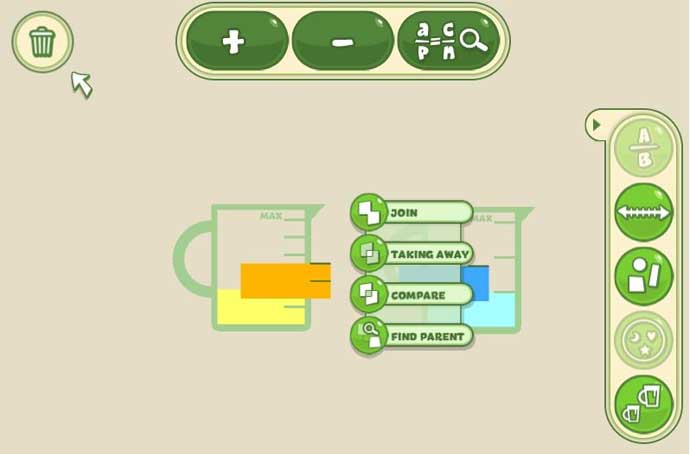In this post, RUB outline findings from tests on the latest version of iTalk2Learn!
One of the challenges in learning fractions is that you need to have both a good grasp of the concepts behind fractions, and the skills to calculate with fractions.
What challenges are we trying to overcome?
One concept that may be hard to understand is that numbers get smaller when they are multiplied by a fraction (even though with whole numbers, numbers get larger when being multiplied). Regarding skills, multiplying with mixed numbers can be challenging because they may need to be converted to improper fractions first.
Combining these so-called conceptual and procedural knowledge types is hoped to result in robust knowledge – flexible knowledge that prepares you to deal with fractions problems in any number of settings.
iTalk2Learn promotes the acquisition of robust knowledge by combining opportunities for exploratory learning that target conceptual knowledge acquisition with structured practice tasks that target procedural knowledge acquisition. Students work with our exploratory learning environment Fractions Lab and receive matching structured practice tasks in Maths-Whizz (UK students) or Fractions Tutor (German students).

Figure 1: The intervention model
What have we found so far?
In the last blog post by RUB, we introduced the intervention model which prescribes strategies for how the iTalk2Learn platform combines exploratory learning and structured practice. Since then, we have been busy piloting these strategies with students in 1-on-1 settings.
Three girls from sixth grade participated in these formative Wizard-of-Oz-evaluation trials. One student had already finished her first unit on fractions, another student had some experience with fractions but had not finished the unit yet and the third student was about to start the unit in the next mathematics lesson. As you can see, the prior knowledge about fractions varied strongly across the three participants. This way, we were able to investigate how the various strategies of the intervention model adapt to students with different levels of prior knowledge.
The students were able to work with the latest version of the iTalk2Learn platform that includes both Fractions Lab and Fractions Tutor. For the student that had not started the fractions unit in school yet, working with iTalk2Learn was challenging, particularly because she was unfamiliar with terminology such as numerator and denominator. In order to master her challenge she first received an introduction into the required terminology and concepts by the experimenter. Additionally, while interacting with iTalk2Learn she received less challenging tasks and a high amount of iTalk2Learn’s task-dependent support for keeping her in her individual zone of proximal development and thus adapt to her needs.
The student who had already started the fractions unit found working with iTalk2learn to be much fun. Interestingly, she said working with Fractions Lab was much cooler than working with Fractions Tutor! We are especially proud of Fractions Lab since it is the first exploratory learning environment that specifically targets fractions and was developed just for iTalk2Learn!

Figure 2: A screenshot from Fractions Lab
What will we do with these findings?
The student who had completed the fractions unit already found the tasks we had prepared for her easy to master. We are very happy to see how the contents of iTalk2Learn are aligned with regular fractions instruction at school. For now, we are focusing on students who have not yet mastered fractions. We believe working with iTalk2Learn will benefit those students the most.
We are now fine-tuning the intervention model and busy programming the platform to intelligently switch between exploratory learning and structured practice, as is best for individual students. 2015 will see several large studies that evaluate the finished iTalk2Learn platform, so stay tuned for more news on the efficacy of learning fractions with iTalk2Learn!


